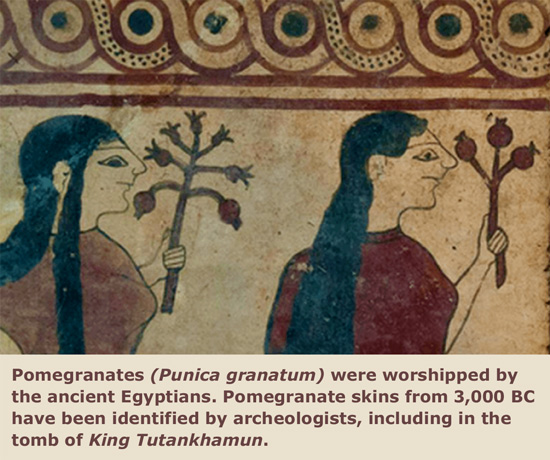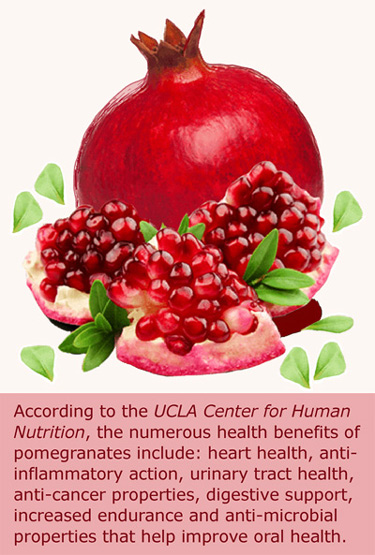People living in desert regions appreciate pomegranate trees (Punica granatum) because they are so resilient and can thrive in harsh conditions.
Meanwhile, people working in laboratories appreciate pomegranates for the myriad of compounds they contain, and the wide range of health benefits they confer.
Just in the past few months two studies have highlighted these diverse benefits. Researchers in Germany studying pomegranate metabolites found pomegranate extracts improve the function of immune cells in their fight against cancer. Meanwhile, a study from England found pomegranates held promise in the weight loss category by improving satiety and helping reduce feelings of hunger between meals.
Brief history of pomegranate for food & medicine
Cultivation and use of pomegranates go back at least 4,000 years. In the Bible, Jewish scouts presented pomegranates to Moses to symbolize the fertility of the Promised Land. Pomegranates were also featured in Greek mythology and the Quran.
In Buddhism, the pomegranate is considered a “blessed fruit,” and some Christian theologians hypothesize that pomegranates were featured in the Garden of Eden.
Using pomegranates medicinally appears to coincide with the earliest cultivation. Traditional healers experimented with virtually all parts of the pomegranate fruit and tree—juice, seeds, leaves, flowers, roots and even the bark.
Ancient Indian Ayurvedic medicine traditionally used pomegranate to lower fever. In Greek medicine the flowers were used to treat diabetes, while the root and bark were used to stop bleeding, dysentery and heal ulcers. The ancient Egyptians used the fruit to combat intestinal worms.
Today pomegranates are still a symbol of health and prosperity in many cultures. It is a part of the Persian weddings where it is placed in a basket over the ceremonial cloth to represent a prosperous future. Likewise, they are used in wedding ceremonies in Turkey, Crete and China.
According to a 2014 study published in Advanced Biomedical Research, the antioxidant potential of pomegranate juice is more than that of red wine and green tea.
According to the study authors, “Pomegranate juice can reduce macrophage oxidative stress, free radicals, and lipid peroxidation. Moreover, pomegranate fruit extract prevents cell growth and induces apoptosis, which can lead to its anticarcinogenic effects.”
With the rich history and solid research, it’s little wonder that pomegranate is used widely in everything from flavorings for soda pop and energy drinks to extracts for antioxidant supplements.
According to Globe Newswire, a market-assessing and reporting service, “The fruit is used in a variety of dishes across the globe, including in sweet pastries in France, ice cream in Italy, preserves in Israel, and Ramadan delicacies in Saudi Arabia. It is also used as a natural sweetener in many countries such as India and Pakistan.”
According to data analytics service SkyQuest, the world-wide pomegranate market size was valued at $24.8 billion in 2021, and it is expected to reach a value of $33.86 billion by 2028.
Globe Newswire asserts this growth can be directly attributed to the extensive nutritional profile of pomegranates: “They are a good source of antioxidants and vitamins, including Vitamin C. Additionally, the fruit is a good source of dietary fiber which helps to reduce the risk of heart disease and other chronic diseases. The antioxidant properties of pomegranates have been shown to combat some forms of cancer. Pomegranate juice has also been shown to help improve lipid profiles and reverse arterial aging.”
IMPROVED IMMUNITY – study details
In the new study on immunity, researchers at Goethe University Frankfurt succeeded in identifying a new approach for the therapy of colorectal cancer by utilizing a pomegranate extract.
By utilizing pre-clinical models, in addition to studies on human immune cells, researchers found that urolithin A, a metabolite product from pomegranate, sustainably improves the function of immune cells in their fight against cancer.
After treatment with urolithin A, tumor-fighting immune cells become T memory stem cells which, due to their ability to divide, constantly supply the immune system with rejuvenated, non-exhausted T cells.
The study was published in Immunity in October 2022.
WEIGHT LOSS – study details
According to researchers at University of Edinburgh, the positive effects of polyphenolic compounds on appetite suppression have already been demonstrated—such as their role in slowing the secretion of appetite-stimulating hormones and inactivation of appetite sensors.
For the new study, published in Foods in August 2022, researchers sought to further evaluate the effects on satiety and food intake utilizing pomegranate extract capsules.
After a three week trial period researchers found that study participants were generally more satisfied after meals, experienced greater fullness 30 minutes after consumption, and found meals more palatable.
“These results could be useful in managing public health and obesity,” the researchers wrote in their study summary.
Pomegranate can be found in the following Optimal Health Systems products:
• Opti-Immune-VRL
• Optimal Fruit & Veggie Plus
Pomegranate is also included in the Whole Food Cultured Media Blend, which is included in many Optimal Health Systems products to enhance cell delivery of nutrients.
– – –
Sources: Immunity (CellPress), Foods (MDPI), Advanced Biomedical Research (PubMed), GlobeNewswire.com, SkyQuestt.com.



